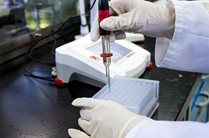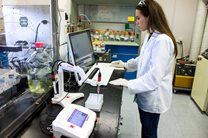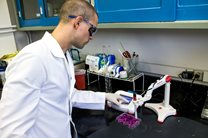For 22 of his 28 professional years in the biotechnology industry, Dr. Sheldon Broedel has been the owner and president of AthenaES, a life science technology development company based in Baltimore, MD. AthenaES has built its reputation on a product portfolio that revolves around providing solutions to barriers of protein production and purification, including novel host-vector expression systems, specialized and custom culture media formulations, protein refolding and assay reagents, and advanced downstream chromatography purification systems. In Broedel's own words, "Proteins are the workhorse in the biological world. Proteins do all the work, and so they can be utilized to affect disease outcome, they can be used to convert one chemical into another chemical in a manufacturing process. Basically, what our company does is provide researchers with the tools they need to do a better job producing those proteins: in other words, to make them faster, better, cheaper."
AthenaES operates under 3 specific umbrellas: the Environmental Sciences unit, which aims to develop environmentally responsible and economically feasible products and manufacturing processes; the Exploratory Sciences unit, which has the mission of developing novel approaches to addressing infectious and inflammatory diseases; and the Enzyme Systems business unit, which is responsible for designing, developing, and manufacturing tools that improve the production and recovery of proteins for the industrial, academic, biotechnology, and biopharmaceutical industries.
Recently, Broedel and his team have begun using the OHAUS ST5000

pH meter with an STMICRO5 electrode in their lab, a decision made easier by OHAUS' long history of accurate and reliable measurement. "I've known about OHAUS for quite a few years," says Broedel. "I'm not sure I can even date back how far it goes, because I've seen OHAUS scales and balances since I was in college. We've had OHAUS products in our own laboratory since we set up a manufacturing operation in 2001."
In the life science industry, much of the day's work is done in the laboratory, researching and developing these solutions. The development and testing of enzymes and proteins relies heavily on pH, a universal truth that has held fast for Broedel throughout the course of his long career. "pH measurement is routinely used for preparing buffers, making media solutions, and we use it for applications development so we know the pH of a particular solution," he says. "Having a pH meter that is reliable and robust and accurate is extremely important to us. The OHAUS ST5000 provides that reliability and robustness in our everyday use."

Mandie Combs, a scientist in the AthenaES R&D lab, says that the ST5000's sophisticated technology has been particularly helpful in her day-to-day work, citing the meter's modern data transfer protocol among its best features. "The ST5000 offers a USB data transfer, which is particularly useful," she says, adding that "the data transfer capability is a key attribute, because we see that as supporting the protein purification work that we do." More than just technologically advanced data transfer, Combs mentions that the lab is also appreciative of the sophisticated data analysis and export features of the ST5000, saying "The most useful features, for us, have definitely been the ability to transfer recorded data to a tab-delineated file and the ability to quickly store samples data; especially when numerous samples are involved." To Combs, the ST5000 and STMICRO5 have added not only reliability and robustness to the AthenaES lab, but convenience as well. "It's very easy to do the calibration setup," she says, "so I can go from buffer to buffer, set up my calibrator curve, and it's essentially ready to go."
With a pH meter staying stationary in one lab, scientists were forced to transport samples via testing strips so as not to contaminate the meter. "Prior to the arrival of the ST5000, the only pH meter we had was designated to our manufacturing area, which meant a lot of back and forth for our R&D team," says Combs. In addition to being time consuming, this method made microplate testing convoluted and raised the potential for inaccuracy. For Combs, the STMICRO5's long, narrow shaft has been the most useful feature. Combs and her team are now able to do pH testing from well to well, affording them a more efficient testing method and a higher resolution of analysis. "Our lab does assay work that requires the use of microplates, which a traditional probe cannot be used with. With the STMICRO5 electrode, the pH of each well can be determined. The microprobe allows me to determine the pH at which the target protein elutes, in small fractions."
Overall, the AthenaES R&D team has found their newest OHAUS

products to be simple to use and effective, allowing them to test their samples quickly and accurately; as a result, they've been able to expand and streamline their workflow. The ST5000's compliance features are an added bonus to the meter's capabilities, with Combs noting "As we look to move forward in our lab using the ST5000, I think the meter having the built-in GLP/GMP feature is good to have, should we need to increase our level of regulatory compliance."
Learn more about the OHAUS
Starter Series